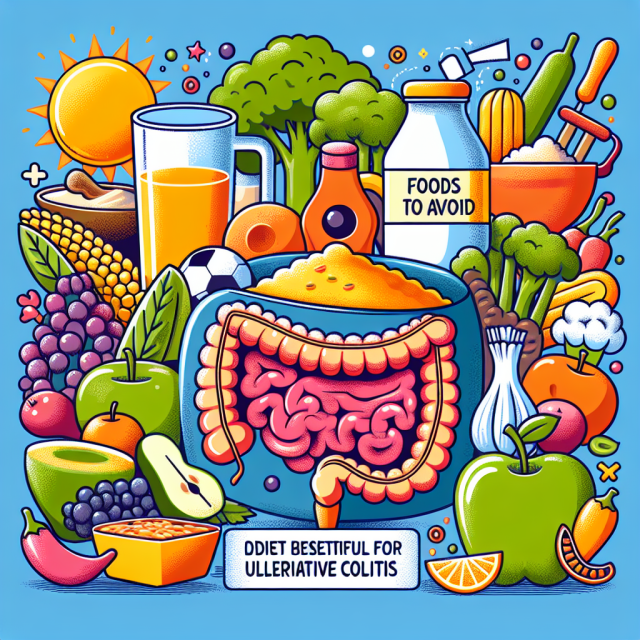
Living with ulcerative colitis is a constant balancing act. What you eat can have a profound effect on your symptoms, making meal choices stressful and confusing. But a well-planned ulcerative colitis diet can provide relief, minimize flare-ups, and improve your overall quality of life. So, how can you eat well without living in fear of your next meal?
Table of Contents
Introduction
Navigating an ulcerative colitis diet isn’t easy. Each bite feels like a gamble, especially during flare-ups. But with a strategic approach to nutrition, you can take back control. This guide will walk you through the best foods to eat, what to avoid, and how to make meal planning less overwhelming. Are you ready to reclaim your plate?
Why Diet Matters in Ulcerative Colitis
Diet doesn’t cause ulcerative colitis, but it can certainly impact how you feel. When the lining of your colon is inflamed, even minor irritants can feel like fuel on a fire. The right foods can soothe and stabilize your digestive system, while the wrong choices can send you into a painful flare.
Think of your gut like a garden. Nourishing it properly can promote healing, while irritants act like weeds that choke out growth.
For a deeper dive into how diet impacts inflammation, check out resources on HealingWell.
General Diet Tips for Symptom Management
Managing ulcerative colitis isn’t a one-size-fits-all approach, but there are universal strategies that can help:
- Eat Small, Frequent Meals: Large meals may overwhelm your digestive system. Smaller, more frequent meals are often easier to handle.
- Avoid High-Fiber Foods During Flares: While fiber is essential for health, it can irritate an already-inflamed colon during a flare-up.
- Keep a Food Journal: Track what you eat and how it affects your symptoms to pinpoint trigger foods.
For community support and more diet tips, visit HealingWell’s Forum.
Foods to Eat During Remission
When you’re symptom-free, it’s the perfect time to nourish your body with anti-inflammatory, nutrient-rich foods:
- Lean Proteins: Chicken, turkey, and fish are gentle on the digestive tract and packed with protein for healing.
- Healthy Fats: Avocados, olive oil, and omega-3-rich fish like salmon can help reduce inflammation.
- Cooked Vegetables: Steamed or roasted veggies are easier to digest than raw ones.
Pro Tip: Avoid raw fruits and vegetables if you feel bloated or notice an increase in symptoms.
Foods to Avoid During a Flare-Up
When you’re experiencing a flare-up, it’s essential to be cautious. Certain foods are more likely to irritate the digestive tract:
- High-Fiber Foods: Raw fruits, seeds, and whole grains can be too harsh on your colon.
- Dairy Products: Many people with ulcerative colitis are sensitive to lactose, especially during flares.
- Spicy and Fried Foods: These can worsen inflammation and should be avoided.
Note: Always listen to your body and adjust as needed. What triggers one person may be fine for another.
Low-Residue Diet: When to Consider It
A low-residue diet is often recommended during severe flares. This diet limits fiber intake, giving your colon a chance to heal. Foods include white bread, pasta, and well-cooked vegetables. It’s a temporary solution but can be lifesaving during intense symptoms.
Hydration: Why It’s Essential
Staying hydrated is crucial, especially if you’re experiencing diarrhea. Water, broths, and electrolyte drinks can help. Avoid caffeinated and alcoholic beverages, which can further dehydrate you.
Tip: If water feels bland, try adding a slice of lemon or cucumber for flavor.
How to Identify Your Trigger Foods
Trigger foods vary from person to person, making it essential to keep a food diary. Write down everything you eat and note any symptoms that follow. Over time, you’ll see patterns that help you tailor your diet.
Example: If spicy foods consistently trigger symptoms, it’s best to avoid them.
Meal Prep Tips for Busy Days
When you’re dealing with ulcerative colitis, meal prep can be a lifesaver. Prepare simple, soothing meals like bone broth, baked chicken, and roasted vegetables in advance. Store them in portioned containers for easy access.
Plan Ahead: Freezing meals can ensure you always have something safe to eat.
Supplements: Helpful or Hype?
Supplements can be beneficial, but they’re not a cure-all. Discuss options like probiotics or omega-3s with your healthcare provider. Be cautious of supplements that may irritate your gut or interfere with medications.
Reminder: Always consult your doctor before adding new supplements to your regimen.
Conclusion
Managing an ulcerative colitis diet can be challenging, but with the right strategies, it’s possible to find relief and enjoy your meals. Remember, what works for one person may not work for another, so stay flexible and patient. Above all, listen to your body and nourish it with care.
FAQs
- What foods should I avoid with ulcerative colitis?
Avoid high-fiber, spicy, and dairy foods during a flare-up, as they can irritate your gut. - Can I eat dairy products if I have ulcerative colitis?
Many people are sensitive to lactose, so it’s best to limit or avoid dairy, especially during flares. - How do I know which foods trigger my symptoms?
Keeping a food diary can help identify patterns and pinpoint trigger foods. - Is a low-residue diet safe for long-term use?
It’s typically a temporary measure used during severe flares. Always consult your doctor for guidance. - Are supplements helpful for ulcerative colitis?
Some, like omega-3s and probiotics, may help, but consult your healthcare provider before starting any new supplements.





